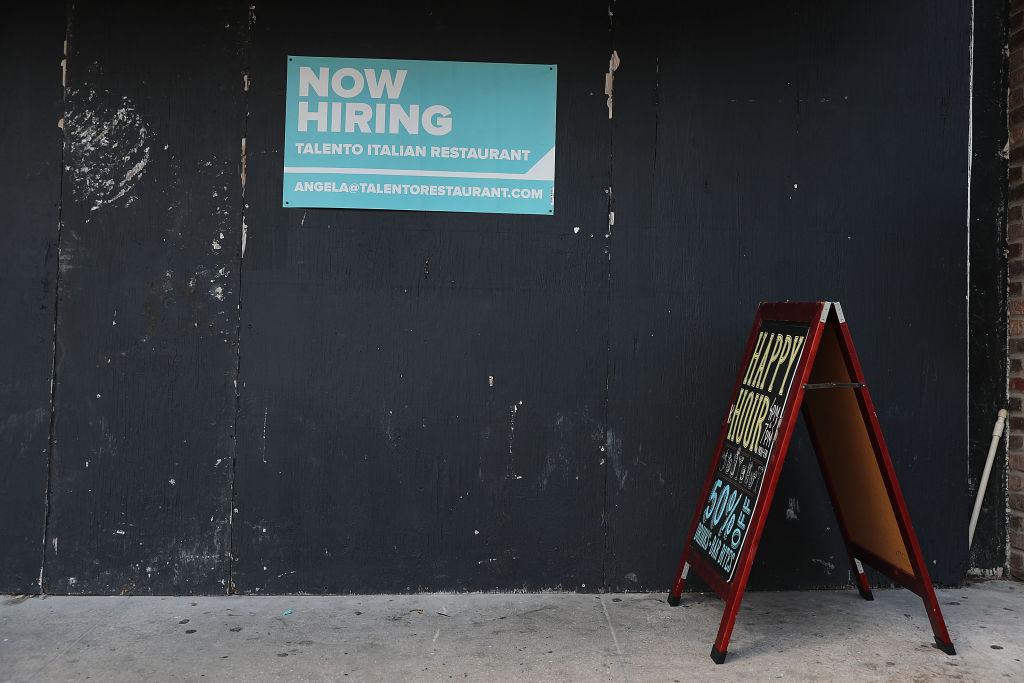How America's jobs recovery left Black women behind


A free daily email with the biggest news stories of the day – and the best features from TheWeek.com
You are now subscribed
Your newsletter sign-up was successful
Although plenty of Americans have this year returned to work or rebounded from a COVID-19 related layoff, the U.S. jobs recovery so far "has largely left behind Black Americans and workers without college degrees," The Washington Post writes.
But chief among those forgotten in the employment bounceback are Black women, whose unemployment is the "least recovered," reports the Post — still, there are "more than 550,000 fewer adult Black women working now than in February 2020," but the broad unemployment rate hides the disparaties.
Women of color frequently cited child-care struggles, health concerns, "overlooked and ignored online applications," as well as too many low-paying jobs as roadblocks in their job hunt, the Post reports.
The Week
Escape your echo chamber. Get the facts behind the news, plus analysis from multiple perspectives.

Sign up for The Week's Free Newsletters
From our morning news briefing to a weekly Good News Newsletter, get the best of The Week delivered directly to your inbox.
From our morning news briefing to a weekly Good News Newsletter, get the best of The Week delivered directly to your inbox.
"I wish people understood the struggle is real," said Jasmine Yates, a Houston-based Black woman whose job search has taken months."If someone actually went on Indeed or ZipRecruiter and saw how often they get ghosted or how many hundreds of people apply for one job, they would see that the struggle is real."
A Labor Department analysis turned out similar qualms: Black men and women are about twice as likely as white Americans to say "they're unable to look for work because they can't find child care or because they have other family responsibilities," a Post analysis reveals.
Even though economists predict a "return to full employment around late 2022," the "unevenness" of the progress thus far is "a reminder that the nation has to watch carefully in the coming months to ensure certain groups aren't left behind."
"Across racial and ethnic groups, we saw a big unemployment shock in the worst possible way," said Bradley Hardy, a Georgetown University professor. But "the unevenness really did widen for Black families and Black workers, in particular."
A free daily email with the biggest news stories of the day – and the best features from TheWeek.com
Brigid Kennedy worked at The Week from 2021 to 2023 as a staff writer, junior editor and then story editor, with an interest in U.S. politics, the economy and the music industry.
-
 5 cinematic cartoons about Bezos betting big on 'Melania'
5 cinematic cartoons about Bezos betting big on 'Melania'Cartoons Artists take on a girlboss, a fetching newspaper, and more
-
 The fall of the generals: China’s military purge
The fall of the generals: China’s military purgeIn the Spotlight Xi Jinping’s extraordinary removal of senior general proves that no-one is safe from anti-corruption drive that has investigated millions
-
 Why the Gorton and Denton by-election is a ‘Frankenstein’s monster’
Why the Gorton and Denton by-election is a ‘Frankenstein’s monster’Talking Point Reform and the Greens have the Labour seat in their sights, but the constituency’s complex demographics make messaging tricky
-
 A Nipah virus outbreak in India has brought back Covid-era surveillance
A Nipah virus outbreak in India has brought back Covid-era surveillanceUnder the radar The disease can spread through animals and humans
-
 Trump HHS slashes advised child vaccinations
Trump HHS slashes advised child vaccinationsSpeed Read In a widely condemned move, the CDC will now recommend that children get vaccinated against 11 communicable diseases, not 17
-
 Covid-19 mRNA vaccines could help fight cancer
Covid-19 mRNA vaccines could help fight cancerUnder the radar They boost the immune system
-
 FDA OKs generic abortion pill, riling the right
FDA OKs generic abortion pill, riling the rightSpeed Read The drug in question is a generic version of mifepristone, used to carry out two-thirds of US abortions
-
 The new Stratus Covid strain – and why it’s on the rise
The new Stratus Covid strain – and why it’s on the riseThe Explainer ‘No evidence’ new variant is more dangerous or that vaccines won’t work against it, say UK health experts
-
 RFK Jr. vaccine panel advises restricting MMRV shot
RFK Jr. vaccine panel advises restricting MMRV shotSpeed Read The committee voted to restrict access to a childhood vaccine against chickenpox
-
 Texas declares end to measles outbreak
Texas declares end to measles outbreakSpeed Read The vaccine-preventable disease is still spreading in neighboring states, Mexico and Canada
-
 RFK Jr. shuts down mRNA vaccine funding at agency
RFK Jr. shuts down mRNA vaccine funding at agencySpeed Read The decision canceled or modified 22 projects, primarily for work on vaccines and therapeutics for respiratory viruses
